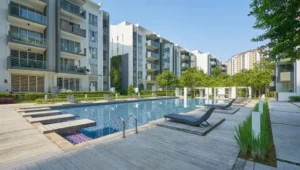Singapore’s strategic location as a gateway to Asia has made it a hotspot for commercial real estate. Business hubs like the Central Business District (CBD) and Marina Bay Financial Centre house global corporations, banks, and tech companies. The demand for Grade A office spaces continues to rise, driven by Singapore’s thriving business ecosystem and its attractiveness to multinational corporations. 
Residential Real Estate
The residential property market in Singapore is broadly divided into public housing (HDB flats) and private properties. Around 80% of Singaporeans live in HDB flats, which are highly regulated to remain affordable for citizens. HDB properties offer a sense of community while maintaining quality living standards. On the other hand, private properties, including condominiums, landed homes, and luxury residences, are highly sought after by high-net-worth individuals and investors. Areas such as Orchard Road, Marina Bay, and Sentosa Cove feature some of the most prestigious and exclusive addresses.
Commercial Real Estate
Singapore’s strategic location as a gateway to Asia has made it a hotspot for commercial real estate. Business hubs like the Central Business District (CBD) and Marina Bay Financial Centre house global corporations, banks, and tech companies. The demand for Grade A office spaces continues to rise, driven by Singapore’s thriving business ecosystem and its attractiveness to multinational corporations.
Industrial Real Estate
Industrial properties play a key role in supporting Singapore’s robust economy. Industrial parks like Tuas and Jurong cater to manufacturing, logistics, and high-tech industries. The government actively supports this sector through initiatives such as the development of “smart factories” and advanced logistics hubs. Sustainability in Real Estate Sustainability is a growing focus in Singapore’s real estate sector. Green buildings are becoming the norm, with developers integrating energy-efficient technologies and eco-friendly materials. The government’s Green Building Masterplan aims to make 80% of Singapore’s buildings green by 2030, further reinforcing the country’s commitment to sustainable urban living.
The Future of Singapore Real Estate
As Singapore continues to evolve as a global hub, its real estate market is poised for growth. Innovations like smart homes, co-living spaces, and sustainable developments are reshaping the landscape. With the government’s continued focus on urban planning and infrastructure, the outlook for Singapore’s real estate market remains positive. Whether you’re a homebuyer, investor, or entrepreneur looking for commercial space, Singapore offers a wealth of opportunities. Its real estate market not only reflects its economic vibrancy but also its commitment to innovation, sustainability, and inclusivity.




